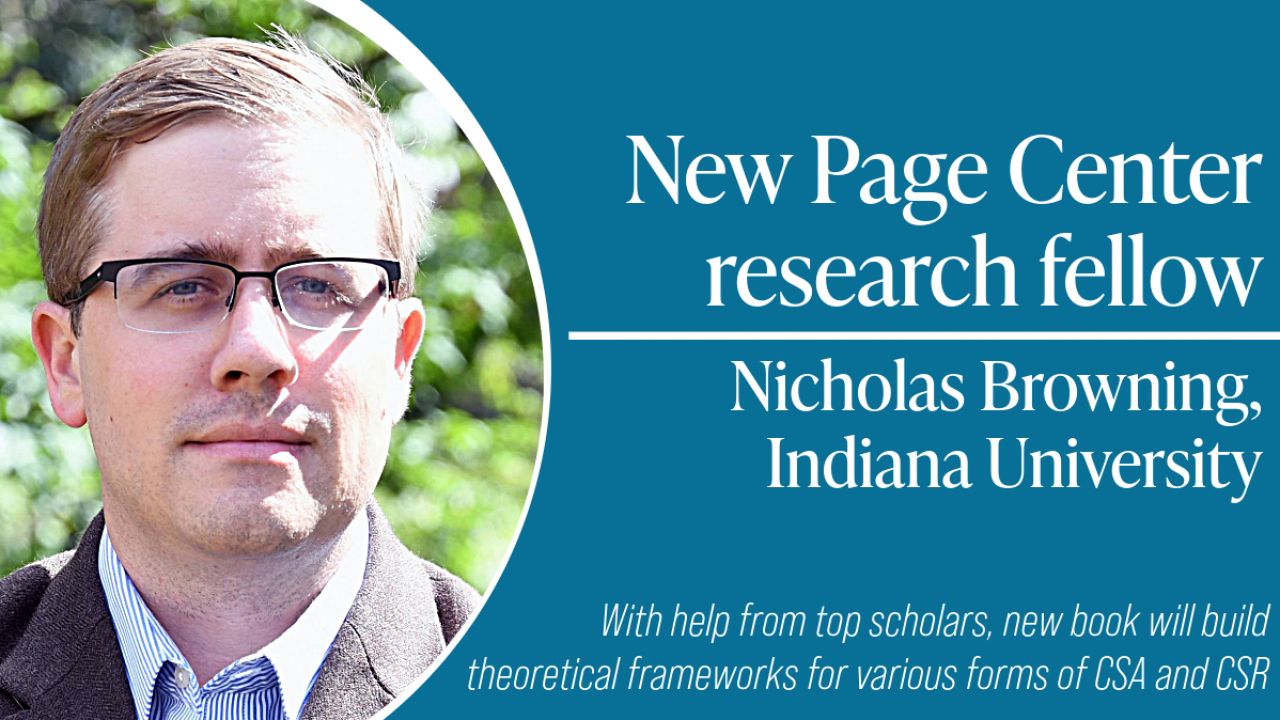November 12, 2024
Research fellow aims to untangle complexities of corporate advocacy in new book

Numerous controversial brand decisions, and the outcries that followed, have scrambled the way corporate interests and social advocacy interact. With help from top public relations scholars, Page Center research fellow Nick Browning hopes to resolve the rapidly evolving, often messy area of the media landscape.
Browning, associate professor at Indiana University, and Center research director Holly Overton are leading a book project that will establish a theoretical framework for various forms of corporate advocacy and social responsibility. Currently, Browning says, definitions and language in these areas are imprecise.
"We have a dozen or so terms floating around, and while there's a lot of overlap, the definitions can vary wildly from one study to the next,” he said. “Our aim is to unpack these concepts and show how they're related, how they're distinct and how they can be applied within the different subdisciplines of public relations."
Browning and Overton assembled a team of top researchers to define these concepts. Each scholar will contribute a chapter to the book. Areas of focus include advocacy in internal communication, crisis communication and political public relations.
"The response has been incredible," Browning said. "We reached out to these leading minds, and every single one of them was eager to be involved. I think that speaks to the importance of this work and the hunger in the academic community to really grapple with these issues in a meaningful way."
Browning added that it's been a team effort, but credit goes to Overton for taking the lead and getting the project off the ground. They hope a draft of the book will be complete by the end of next year. The collection of peer-reviewed studies will advance theory in the field of ethics and public relations, and it will provide valuable insights for academics and practitioners.
"This is about more than just advancing theory," Browning said. "It's about providing a resource that can inform graduate education and shape the way we approach these topics in the classroom.”
He added, “Ultimately, we want to help practitioners navigate the complexities of corporate advocacy and social responsibility in a more thoughtful, ethical manner."
Browning’s interest in communication and organizational ethics is inspired by his professional experience in both the academic and corporate worlds. Working in the healthcare sector early in his career, he encountered ethical questions and regulatory issues. His natural curiosity and self-proclaimed cynicism led him to ask questions about corporate motives in the advocacy space.
"There's this idea that if an organization is doing something that appears ethical or socially conscious, then it must be inherently good," Browning said. "But I've always been a bit of a cynic on that front. So much of it can be calculated, driven by economic incentives rather than genuine ethical drivers. And that's where the real questions start to emerge."
He said he’s grateful to the Page Center for supporting the research that will help answer these questions.
“I love what the Page Center does,” he said. “The Center has a dual focus. It’s not just a research commitment, but also finding out what the practical takeaways are.”

